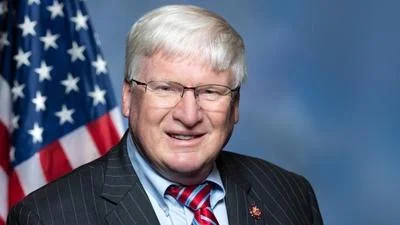Lee Snodgrass, Wisconsin State Representative for 52nd District | Facebook
Lee Snodgrass, Wisconsin State Representative for 52nd District | Facebook
According to the Wisconsin State Legislature's official website, the bill was described as follows: "requiring vehicles to stop for pedestrians at certain intersections and crosswalks".
The following is our breakdown, based on the actual bill text, and may include interpretation to clarify its provisions.
In essence, this bill mandates that vehicle operators must stop and remain stopped for pedestrians, personal delivery devices, bicyclists, and riders of electric scooters or electric personal assistive mobility devices at crosswalks and intersections until they have fully crossed the roadway. Current laws require operators to yield right-of-way, defined as reducing speed or stopping to avoid interference; however, this bill strengthens the requirement to necessitate a full stop. These changes apply to intersections and crosswalks, both controlled and uncontrolled by traffic signals or officers, as well as those on divided highways or with safety zones. The effective date impacts offenses occurring on or after its implementation but allows for prior convictions to influence sentencing and administrative decisions regarding driver's license status.
The bill was co-authored by Senator Chris Larson (Democrat-7th District), Representative Mike Bare (Democrat-80th District), Representative Brienne Brown (Democrat-43rd District), Representative Ryan M. Clancy (Democrat-19th District), Representative Ben DeSmidt (Democrat-65th District). It was co-sponsored by Senator Tim Carpenter (Democrat-3rd District), Senator Kristin Dassler-Alfheim (Democrat-18th District), and Senator Dianne H. Hesselbein (Democrat-27th District), along 19 other co-sponsors.
Lee Snodgrass has co-authored or authored another 60 bills since the beginning of the 2025 session, with all of them being adopted.
Snodgrass graduated from the University of Wisconsin-Madison in 1991 with a BA.
Snodgrass, a Democrat, was elected to the Wisconsin State Assembly in 2025 to represent the state's 52nd Assembly district, replacing previous state representative Jerry L. O'Connor.
In Wisconsin, the legislative process starts when a senator, constituent, group, or agency proposes an idea for a bill. After drafting, the bill is introduced, numbered, and referred to a committee for review and public input. If approved, it moves through three readings and votes in both the Senate and Assembly. Once both chambers pass the same version, the bill goes to the governor, who can sign it, veto it, or let it become law without a signature. Only a small share of bills introduced each session ultimately become law. You can learn more about the Wisconsin legislative process here.
| Bill Number | Date Introduced | Short Description |
|---|---|---|
| AB332 | 07/08/2025 | Requiring vehicles to stop for pedestrians at certain intersections and crosswalks |
| AB314 | 06/06/2025 | Adopting gender-neutral terminology and incorporating gender-neutral marriage and parentage rights. (FE) |
| AB291 | 05/30/2025 | Native prairie and forage plants |
| AB290 | 05/30/2025 | Special registration plates to support protecting pollinators and making an appropriation. (FE) |
| AB289 | 05/30/2025 | Ban on the use of certain insecticides by the Department of Natural Resources |
| AB288 | 05/30/2025 | Labeling plants as beneficial to pollinators. (FE) |
| AB287 | 05/30/2025 | Local regulation of pesticides to protect pollinators |
| AB246 | 05/08/2025 | Cost-sharing caps on prescription drugs and medical supplies to treat asthma under health insurance policies and plans. (FE) |
| AB227 | 04/23/2025 | Inducements to sign or refrain from signing nomination papers, recall petitions, and certain other petitions |
| AB224 | 04/23/2025 | The form of referendum questions |
| AB215 | 04/23/2025 | Eliminating the publication requirement for a name change petition seeking to conform an individual’s name with the individual’s gender identity |


 Alerts Sign-up
Alerts Sign-up